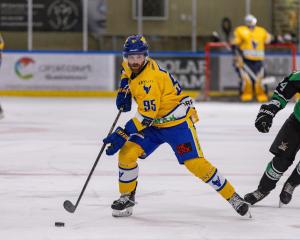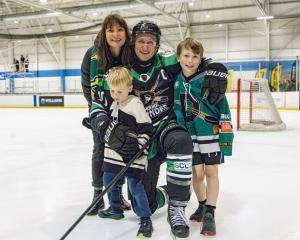New Zealand's ice hockey team was on the receiving end of a world record 58-0 shellacking by Australia at the 1987 world championships in Perth. Sports reporter Robert van Royen talked to the former president of New Zealand ice hockey, Graham Glass, who played for the Ice Blacks on that infamous day, about the match and the changes it caused to the game, both in New Zealand and internationally.
THE BACKGROUND
The New Zealand Ice Hockey Federation (NZIHF) had only been established about seven months before the official national side travelled to Perth to play in group D of the the 1987 world championships.
Pitted against Australia, Hong Kong and South Korea, New Zealand was making its debut on the international ice hockey scene.
Before 1987, a team from Auckland, which ''thought they were the New Zealand team'', had gone to Australia a couple of times. But it was a club team.
Graham Glass (62), who was 35 and ''long in the tooth'' in 1987, was part of the New Zealand team coached by Bryan Lewthwaite, an expat Canadian and former Gore schoolteacher.
''The team wasn't selected on merit, it was selected regionally,'' Glass said.
''There were representatives from all of the clubs in the South. At the time, in Auckland, they weren't involved with the federation.
''The rest of the team was made up of guys from Canterbury.''
Despite no international experience, the team went to Perth full of confidence.
''We had come from the wilderness,'' Glass said.
''We went over there thinking, `We will show these guys how to play ice hockey'. But it was a bit of a different world out there.''
Before playing the Australians, New Zealand played South Korea on the opening day and was
promptly shot back down to Earth with a 35-2 hammering.
''The funny thing was ... our coach said to us before the game, `I want you guys to go out there and knock these Korean guys around. They are pretty small, knock them around a bit,'.
''So we get out on the ice and the Koreans are all military guys. They were fast and fit; we couldn't even catch them, let alone knock them around,'' Glass said.
THE OPPOSITION
The Australian team, if you could call it ''Australian'', was stacked with Canadians and Finnish, who were playing domestically across the ditch.
There ''might have been one or two'' Aussies in the team, but when it came to singing the national anthem, they did not have a clue, Glass said.
Before the puck dropped in the record-breaking game, the New Zealanders thought the Australians feared them.
''Someone had said to us, `The Australian guys were watching you guys practise and they were all standing there with their mouths wide open,','' Glass said.
''We were all thinking, `Yeah, they are really scared of us'. In hindsight, their mouths were wide open because they were just blown away by the lack of skill that we actually had.''
THE GAME
After the so called ''Australians'' failed to sing their own national anthem, the puck dropped on March 14, 1987, and the New Zealanders had no idea what was about to hit them.
''It's all a bit of a blur, really,'' Glass said.
''I think they scored five or six goals in the first few minutes. Our goalie pulled himself off and another goalie came on. Of course, he had to put up with the rest of the onslaught.
''They just racked up a stack of goals.''
Partway through the game, Australian management called the International Ice Hockey Federation (IIHF) to find out what the record (47 goals) was, then went all out to pursue it.
Glass, who grew up in Albury, South Canterbury, with an ice hockey rink on his family's farm, played on the right wing in the match and cannot remember what was said after the game.
''I think we were just stunned because every time the puck dropped, next thing, `boom, boom', and it was another goal.''
By the time the game was over, New Zealand had conceded 95 goals in its first two games of the championships and was on the wrong side of a record that still stands today.
The next day, the Kiwis had something to smile about after thumping Hong Kong 19-0 to record their maiden win.
However, before the campaign ended five days later, New Zealand was again beaten by South Korea (21-2) and Australia (29-0).
New Zealand finished its campaign with another 19-0 win against Hong Kong to finish third in the group and 27th overall in the world.
THE AFTERMATH
It did not take long for the IIHF to change rules around eligibility, after the world championships concluded.
A quick look at Australia's goal tally through six games - 177 for and just six against - and it is pretty obvious something needed to be done.
New rules were introduced to stop players jumping from one country to the other.
Foreign-born players who wanted to represent another country had to officially transfer to their chosen country, and play ice hockey domestically for two years.
Glass gave up playing and moved into an administrative role with NZIHF.
He managed the national side that competed in the world championships in Belgium in 1989New Zealand lost all four of its games against Belgium, Romania, Great Britain and Spain, conceding 96 goals and managing just four of its own in the campaign.
Australia did not fare much better in group C, losing all seven of its games, albeit against some tough opposition like the Netherlands, Yugoslavia, China and Hungary.
After returning home, Glass knew changes needed to be made to make New Zealand more competitive.
''I came back and made a report to the federation and said, `Look, we have got some serious work to do. We need to start working hard on the coaching; we have got to teach kids all the basics from the get go, and in 10 years' time we may be competitive,'.
''And that sort of happened. Not because of my recommendation, but gradually over the years,'' he said.
Glass became president of NZIHF in 1999, a position he held for 10 years.
Shortly afterwards, the IIHF realised it needed to start promoting the game and boosting it in countries like New Zealand.
It set up a programme which saw coaching clinics set up around the world.
''The IIHF came up with a learn-to-play programme for kids and really started getting it going. We started pushing that side of it and it's started to pay off,'' Glass said.
The launch of the national league in 2005 was also an important step to improve ice hockey in the country.
''That was the next crucial step. Because that meant the top players were getting more competition at a higher level. Up until then, our national championship was a one-off thing over a weekend,'' Glass said.
Until the Dunedin Thunder formed in 2008 to make it a five-team league, there were two teams in Auckland, one in Christchurch and one in the Southern region.
While the league allows imports, league rules state teams can only dress four imports per game and two assimilated players who intend to play for New Zealand or live here long-term. However, there is no limit to how many imports a team can carry on its roster.
''What's happened over the years is the level has raised, and now the level of the import players is better and it's just bought the whole level up and made our [international] teams much more competitive.
NEW ZEALAND ICE HOCKEY TODAY
The Ice Blacks beat Australia for the first time at the 2011 Winter Games in Dunedin at the 2011 Winter Games.
New Zealand's women's team, the Ice Fernz, recorded its first ever win against Australia in 2013 with a thrilling 4-3 win.
At the under-20 and under-16 levels, New Zealand has also recorded wins against Australia.
The Ice Blacks, coached by Dunedin Thunder coach Janos Kaszala, now play in division II B in the world championships, and head to South Africa in April for the 2015 campaign.
They finished third in its pool last year to finish 37th overall in the world.
Dunedin will host the world under-20 (division three) championships next week, a tournament New Zealand won in 2008 in Belgrade.
While the sport is well behind the majority of other team sports in the country in terms of playing numbers and world ranking, there is no doubt there has been significant development and improvements since that record-breaking day in 1987.








